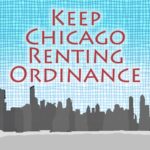 Okay, so we have gone through the notice provisions and the relocation assistance portions of the brand new Keep Chicago Renting Ordinance. Today, we will address the section of the law dealing with registration requirements for foreclosed rental properties under 5-14-060 of the Chicago Protecting Tenants in Foreclosed Rental Property Ordinance.
Okay, so we have gone through the notice provisions and the relocation assistance portions of the brand new Keep Chicago Renting Ordinance. Today, we will address the section of the law dealing with registration requirements for foreclosed rental properties under 5-14-060 of the Chicago Protecting Tenants in Foreclosed Rental Property Ordinance.
Registration Requirement. Simply put, the City of Chicago wants to know about foreclosed properties when they are sold. Why? Probably a number of reasons. Among them, possibly the desire to send a building inspector out to check out that everything is copacetic. In any event, the law requires that “no later than 10 days after becoming the owner of a foreclosed rental property, the owner shall register such property…” The registration is to be made to the Commissioner of the Chicago Department of Buildings.
Information to be Provided. The registration, to be made on the form provided by the City, must include the following information:
- owner’s name, address, and phone number
- address of the foreclosed rental property
- the number of rental units in the property
- whether each rental unit is occupied by a known tenant and, if known, the known tenant’s name and address
- name, address, and phone number of the agent responsible for managing, controlling, or collecting rents and/or any other person not the owner who is in control of the property, if any
- name, address, and phone number of any natural person age 21 or older designated by the owner to be the authorized agent for receiving code violation notices and for service of process in any code proceeding or administrative enforcement on behalf of the owner. (for this item, the person must have an office or actually reside within Cook County, Illinois) [an owner meeting these requirements may designate himself or herself as agent]
- a signed affidavit executed by the owner listing, by rental unit, all qualified tenants as of the time the owner became the owner
- any other pertinent information reasonably required by the Commissioner of the Department of Buildings
Other Information. In addition, the owner has a duty to make all information the Commissioner of the Department of Buildings requests available within 10 business days (note: this is different than the 10 calendar day requirement to register with the Commissioner).
Service of Process. With respect to the designated agent for receiving notices and process, the filing is said to constitute consent to receive any and all notices of code violations concerning the property and all process in court or administrative enforcement proceedings. In addition, any owner who fails to register as required is automatically deemed to consent to receive any and all notices of code violations concerning the property and all process in court or administrative enforcement proceedings by way of posting at the foreclosed rental property. See what they are doing there? They are making it very easy to serve the owner.
Registration Fee. So, what does the landlord have to pay in order to have the honor of being easy to be served? Free? Haha, you don’t believe that, do you? No good law fails to include a registration fee! All the owner needs to do is pay $250 per foreclosed rental property to the City of Chicago. After all, someone has to pay for this trouble, right?
Changes in Information. What if required information detailed above, like the agent for service of process, changes? Well, the owner will then have to give notice to the Commissioner of the Department of Buildings stating the nature and effective date of the change within ten days after the change takes effect. Another time deadline? Yes.
Sale of Foreclosed Rental Property. If the owner sells the property or transfers it to a bona fide third-party purchaser, then the owner has 10 days after the date of sale to notify, on the form provided by the City, the Commissioner of the Department of Buildings of the sale in writing. Keep in mind, this is in addition to any notices upon sale that have to be served to tenants under the CRLTO.
Why are they Doing This? If you’ve been with me this week, you probably already know why the City is doing this. They want compliance with their laws – the building code, the CRLTO, the vacant building ordinance, etc. The law goes so far as to provide that the registration filed by the owner will be considered prima facia proof that the statements in the registration are true in any “administrative enforcement proceeding or court proceeding instituted by the city against the owner”. They didn’t put that provision in there because they didn’t plan to enforce their laws! Finally, the law goes so far as to provide that in the event that the rental property goes vacant after registration, the owner agrees to comply with the terms of the vacant building registration requirements in Chapter 13-12 of the Code of Chicago (yes, another registration and another law to comply with).
The City has a master plan here. Its not, perhaps, insidious or malevolent. I am sure it is borne of a desire to turn housing in the City around. But, owners need to be aware of these provisions before they buy or they will be in for quite a shock! Tomorrow, we will deal with the big enchilada – the penalties for failure to comply with this wonderful law!
